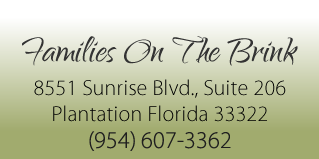
1. How is Families on the Brink different from traditional counseling?
Traditional family counseling by experienced clinicians can be quite effective. However it also has many limitations-- like only hour long sessions once a week. In our experience, this is not enough to help families who are experiencing high conflict or crisis. That is why we schedule 2-3 Day (12 hours) intensives. We find that we can more easily get to the core issues and begin resolution with the added time and intensity. After years of doing traditional counseling, we have found there is no comparison to the dramatic changes that can be made during our intensives. Our approach is also multi-modal--utilizing male-female co-therapy teams, solution focused coaching, family exercises, and team consultations. In addition, our approach is different because treatment is tailored to your specific relationship needs. One way we do this is to match you with a therapist with extensive experience with your particular issues. For example, we have therapists that specialize in behavior problems, school problems, anxiety, depression, anger management, communication, eating disorders, stress, phobias, addiction, sexual issues and many others.
2. What experience do Brink therapists have?
Our clinicians are Licensed Marriage & Family Therapists, and registered with the state of Florida Department of Business and Professional Regulation. We only choose clinical staff with extensive educational and experiential training in family therapy. Many mental health practitioners practicing today say they work with couples. This is not illegal or unethical, however, unless their graduate and postgraduate training is specifically in couples work, they will be ineffective with high conflict couples and people in relationship crisis. Without proper training, they will lack the knowledge and necessary tools needed to work with couples in distress. They are also more apt to view severe relationship problems as unending and hopeless and therefore more likely to recommend splitting up.
3. What style of therapy do Brink therapists practice?
Our clinicians are trained to work with families from a strength-based perspective. What this means is that in even the most desperate of circumstances, there are strengths and resources that can be built upon to make important changes. Typically, our focus is in the here and now, helping people relate to one another differently from the start. This has an immediate positive impact. We also explore at length your current interactional patterns and suggest possibilities for differences to occur. Finally, we believe no two families are exactly the same and we design our intervention plans based on each family’s individual needs.
4. How do I know if you can help with our specific problems?
When you've worked with families work as long as we have, there isn't much you don't get to see. Tailored treatment means that we take the time to assess exactly what your family needs.
Although specific issues are important, we have found that families in distress have certain identifying characteristics. For example, the people we see are frustrated, angry, depressed, are losing or have lost hope, and usually have different ideas about thier problems and what if anyting needs to happen. In our experience, many couples break up just before a major changes are possible. The potential for positive change really does occur after hitting bottom. It is unfortunate that many couples choose to end their relationship just prior to witnessing a positive transformation.
5. Do you accept insurance?
No. Here is why: Insurance companies ask that we diagnosis someone in your family with a mental disorder. This can stay on your record for years to come and may prevent you from obtaining a job or qualifying for other types of insurance. Also, if you really do not have a mental disorder, but it's been diagnosed just to collect insurance, your insurance company may challenge the diagnosis leaving you responsible for the bill. It's just not worth the risk.
6. Why do we recommend such an intensive approach?
We have found that for families who are really struggling, the greatest chance of success exists when people are willing to make a commitment of time and resources. Rarely is one or two hours of intervention helpful for families in high conflict or for families experiencing a major crisis. Deciding to commit to an intensive lets the entire family know that they are willing to give a substantial effort to figuring things out. Also, keep in mind that in addition to meeting with your therapist or co-therapy team, you also get the benefit of our solution focused coach, as well as family bonding exercises all of which challenge you to work together to address your families needs. In addition, we also make use of team consultations. For part of your intensive, you will get the perspectives and observations of a team of experts dedicated to helping your family create significant changes. We also provide unlimited e-mail support after your intensive as well as a therapeutic summary document to reinforce the gains made in your intensive.
7. Can we pay by the hour?
Yes, but we have found the greatest gains are made when families make a commitment to one another and to the process of getting help. Hourly therapy is good for minor problems and issues. However, we find that families in crisis or with years of conflict are generally not helped by hourly approaches to help. We can't overstate the effectiveness of getting out your comfort zone and committing to the process of getting help.
 |
|
||||||
 |
|||||||